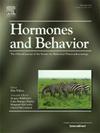多巴胺激动剂影响雄性túngara蛙的社会决策
IF 2.4
3区 医学
Q2 BEHAVIORAL SCIENCES
引用次数: 0
摘要
当发声时,许多动物参与决策过程,整合有关当前社会背景的信息。中脑多巴胺能系统可能为这一过程提供了一个保守的机制。例如,在鸣禽中,多巴胺释放的调节似乎有助于社会环境对歌曲的依赖变化。然而,对于多巴胺在其他类群中对类似的发声和决策过程的贡献程度,特别是在发声能力强的无脊椎动物(青蛙和蟾蜍)中,我们所知相对较少。在这里,我们用一种通用的多巴胺激动剂(阿波啡)治疗野生雄性túngara青蛙(Engystomops pustlosus),并评估其对运动表现和动机的影响,以及对社会相关性不同的听觉刺激的声音决策的影响。我们发现多巴胺激动剂通常会增加声音速度,减少反应延迟和呼叫持续时间。此外,我们发现多巴胺增加了呼叫复杂性,但仅在对最具社会相关性的听觉刺激(同向呼叫)做出反应时才会增加。最后,多巴胺治疗和听觉刺激相互作用,影响呼叫时间和与刺激重叠的决策。与对照组相比,服用阿波啡的青蛙更有可能以一种预测对雌性更具吸引力的方式重复播放刺激。这些结果突出了多巴胺能回路在调节基于社会输入的声音输出中的作用。本文章由计算机程序翻译,如有差异,请以英文原文为准。

A dopamine agonist affects the social decision-making of calling male túngara frogs
When vocalizing, many animals engage in decision-making processes that integrate information regarding the current social context. The midbrain dopaminergic system may provide a conserved mechanism underlying this process. For instance, in songbirds, modulation of dopamine release appears to contribute to social context-dependent changes to song. However, relatively little is known about the degree to which dopamine may contribute to similar vocal production and decision-making processes in other taxa, particularly the highly vocal anurans (frogs and toads). Here, we treated wild-caught male túngara frogs (Engystomops pustulosus) with a general dopamine agonist (apomorphine) and assessed its effects on motor performance and motivation as well as vocal decision-making in response to auditory stimuli that varied in social relevance. We found that the dopamine agonist generally increased vocal speed, with decreases in response latencies and call durations. Additionally, we found that dopamine increased call complexity, but only in response to the most socially relevant auditory stimulus (conspecific call). Finally, dopamine treatment and auditory stimulus interacted to affect decision-making regarding call timing and overlap with the stimulus. Compared to controls, frogs with apomorphine were more likely to overlap the playback stimulus in a manner predicted to be more attractive to females. These results highlight a role of dopaminergic circuits in modulating vocal outputs based on social inputs within a species of basal tetrapod.
求助全文
通过发布文献求助,成功后即可免费获取论文全文。
去求助
来源期刊

Hormones and Behavior
医学-行为科学
CiteScore
6.70
自引率
8.60%
发文量
139
审稿时长
91 days
期刊介绍:
Hormones and Behavior publishes original research articles, reviews and special issues concerning hormone-brain-behavior relationships, broadly defined. The journal''s scope ranges from laboratory and field studies concerning neuroendocrine as well as endocrine mechanisms controlling the development or adult expression of behavior to studies concerning the environmental control and evolutionary significance of hormone-behavior relationships. The journal welcomes studies conducted on species ranging from invertebrates to mammals, including humans.
 求助内容:
求助内容: 应助结果提醒方式:
应助结果提醒方式:


